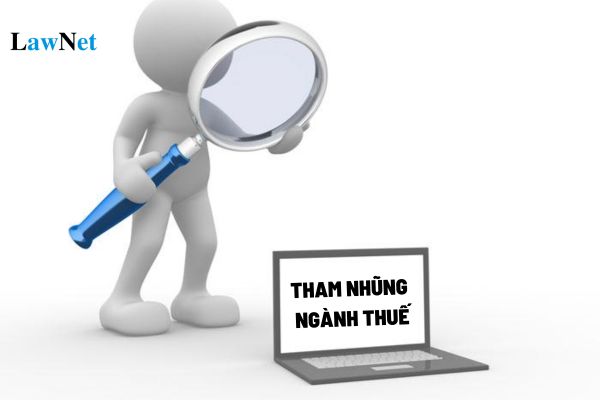What are the corruption acts in the tax sector in Vietnam?
What is corruption in the tax sector in Vietnam?
Pursuant to the provisions of Article 22 of the Regulation on the Prevention, Combat of Corruption in the Tax Sector issued together with Decision 742/QD-TCT of 2020, corruption in the Tax sector is defined as behaviors related to the ethics, qualities of officials and public employees adversely affecting the reputation of the Tax sector.
What are the corruption acts in the tax sector in Vietnam?
According to the provisions of Article 5 of the Regulation on the Prevention, Combat of Corruption in the Tax Sector issued together with Decision 742/QD-TCT of 2020, corruption acts include:
(1) Embezzlement of assets.
(2) Accepting bribes.
(3) Abuse of position, power to misappropriate assets.
(4) Exploiting position, power in performing duties, official duties for personal gain.
(5) Abuse of power while performing duties, official duties for personal gain.
(6) Exploiting position, power to exert influence on others for personal gain.
(7) Falsification in work for personal gain.
(8) Giving bribes, mediating bribes to address the work of agencies, organizations, units, or localities for personal gain.
(9) Exploiting position, power to illegally use State assets for personal gain, including the following acts:
- Using State assets for personal purposes.
- Renting out State assets, lending State assets.
- Using State assets beyond policies, limits, standards.
(10) Harassment for personal gain.
(11) Not performing, performing incorrectly or inadequately duties, official duties for personal gain.
(12) Exploiting position, power to cover up for law-violating individuals for personal gain; obstructing, illegally interfering in the supervision, inspection, audit, investigation, prosecution, trial, enforcement of judgments for personal gain.
Based on the corruption acts defined above and the actual situation of each specific corruption case, tax authorities at all levels are responsible for reviewing and applying appropriately to ensure the identification and handling of corruption acts as per legal regulations.

What are the corruption acts in the tax sector in Vietnam? (Image from the Internet)
What are disciplinary principles officials and public employees with corruption acts in the tax sector in Vietnam?
The disciplining of Tax sector officials and public employees with corruption acts must follow the principles stipulated in Clause 1, Article 23 of the Regulation on the Prevention, Combat of Corruption in the Tax Sector issued together with Decision 742/QD-TCT of 2020 as follows:
Principles, Authority, Process, Procedures for Disciplinary Action
1. The principles for considering disciplinary action are implemented according to the provisions of Article 2, Chapter I of Decree No. 34/2011/ND-CP dated May 17, 2011, of the Government of Vietnam, concerning the disciplinary action of officials; Article 3, Chapter II of Decree No. 27/2012/ND-CP dated April 6, 2012, of the Government of Vietnam, concerning disciplinary action of public employees and the responsibility for compensation, reimbursement of public employees.
...
However, Decree 34/2011/ND-CP concerning the disciplinary action of officials has expired as of September 20, 2020, and the content related to disciplinary action of public employees stipulated in Decree 34/2011/ND-CP has been abolished by Point b, Clause 2, Article 44 Decree 112/2020/ND-CP.
Currently, the document regulating the principles of disciplinary action; the application of corresponding disciplinary forms to violations; the authority, procedures, and procedures for disciplining officials and public employees is Decree 112/2020/ND-CP (Effective from September 20, 2020).
Therefore, the principles for considering disciplinary action against Tax sector officials and public employees with corruption acts are carried out as per the provisions of Article 2 of Decree 112/2020/ND-CP (amended and supplemented by Clause 2, Article 1 Decree 71/2023/ND-CP) as follows:
- Ensure objectivity, fairness; openness, strictness; accuracy, promptness; correct authority, process, and procedures.
- Each act of violation is only subject to one disciplinary form. At the same time of considering disciplinary action, if officials and public employees have 02 or more violations, they are considered and concluded on each violation and decided with one highest form corresponding to the violations.
- In case officials and public employees continue to violate while serving a disciplinary decision, they are subject to disciplinary forms as follows:
+ If the violation is subject to a lighter or equal disciplinary form compared to the current disciplinary form, a higher level of disciplinary form than currently enforced is applied;
+ If the violation is subject to a higher disciplinary form than currently enforced, a higher level of disciplinary form than the one applied to the new violation is enforced.
- When considering disciplinary action, the content, motive, nature, level, consequence, cause of violation, specific circumstances; aggravating or mitigating circumstances; acceptance and correction attitude; defect remediation, violation, consequence; other cases as prescribed by the Communist Party and law are considered as grounds for considering exemption or mitigation of responsibility.
- No spouse, biological parent, spouse’s parent, adoptive parent, biological child, adoptive child, full sibling, aunt, uncle, counselor, advisor, full siblings of the spouse or the spouse of full siblings or a person with rights, obligations related to the violation under consideration for disciplinary action is to be appointed as a member of the disciplinary council or as the chairperson of the review meeting.

